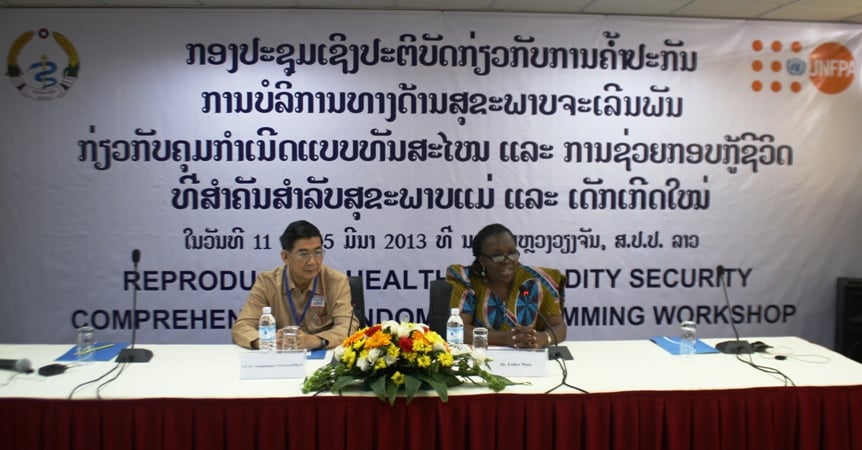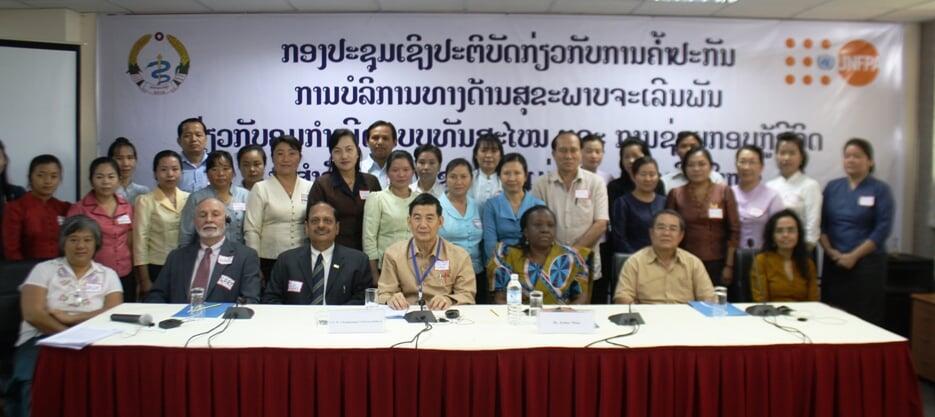VIENTIANE, Lao PDR - March 11, 2013. In Laos, couples and individuals have the right to decide whether, when and how many children to have. Yet, many people who want to space their families lack access to modern contraceptive methods and other supplies to protect their reproductive health. This results in hundreds of unintended pregnancies, many of which result in unsafe abortion or maternal or infant death. Unprotected sex also poses high risks of contracting HIV and other sexually transmitted diseases.
These and other concerns were discussed during the Reproductive Health Commodity Security (RHCS) and Comprehensive Condom Programming (CCP) Workshop for health officials, held in Vientiane from 11 to 15 March. The activity was organized by the Ministry of Health (MoH) with support from the United Nations Population Fund (UNFPA).
"RHCS means that all individuals can obtain and use affordable, quality reproductive health supplies of their choice whenever they need them. This requires a multi-sectoral approach and continuous commitment: it needs to be addressed in a coordinated manner in order to mobilize resources and strengthen national capacity" said Associate Professor Dr. Chanphomma Vongsamphan, Director of the Department of Health Care from the Ministry of Health.

"Universal access to a reliable supply of contraceptives, condoms, medicines and equipment saves and improves lives. A choice of contraceptives empowers couples to plan their families. Condoms can keep HIV and other STI's from spreading. An inexpensive medication can keep a woman from bleeding to death in childbirth" Said Dr. Esther Muia, UNFPA Representative
The workshop was aimed to strengthen the capacity of MoH staff to establish an efficient and effective Reproductive Health Commodity Security (RHCS) system as well as to explore ways to integrate Comprehensive Condom Programming into the existing RHCS programme.
The 5-days event brought together around 30 government officials from the Mother and Child Health Centre, the Medical Supply Product Centre, the Planning Department, the Center for HIV/STI's, the Department of Food and Drugs and the Department of Health Care of MoH at the central level as well as some participants from Savannakahet, Luang Namtha, Phongsaly and Oudomxay provinces in order to strengthen inter-programme collaboration and coordination as well as to augment programmatic synergies. The activity also saw the participation of Dr. Vinit Sharma, UNFPA's regional advisor for reproductive health and Mr Gary Steele, consultant specialized in reproductive health.
The training included sessions on forecasting, procurement, warehousing, supply chain management and monitoring & evaluation of reproductive health commodities. Challenges and successes in improving RHCS/CCP at the country and provincial levels as well as the way forward were discussed as part of the workshop.
Contact information: Mr. Diego De La Rosa, UNFPA tel:021-315547, mobile: 020-59936509 drosa@unfpa.org


